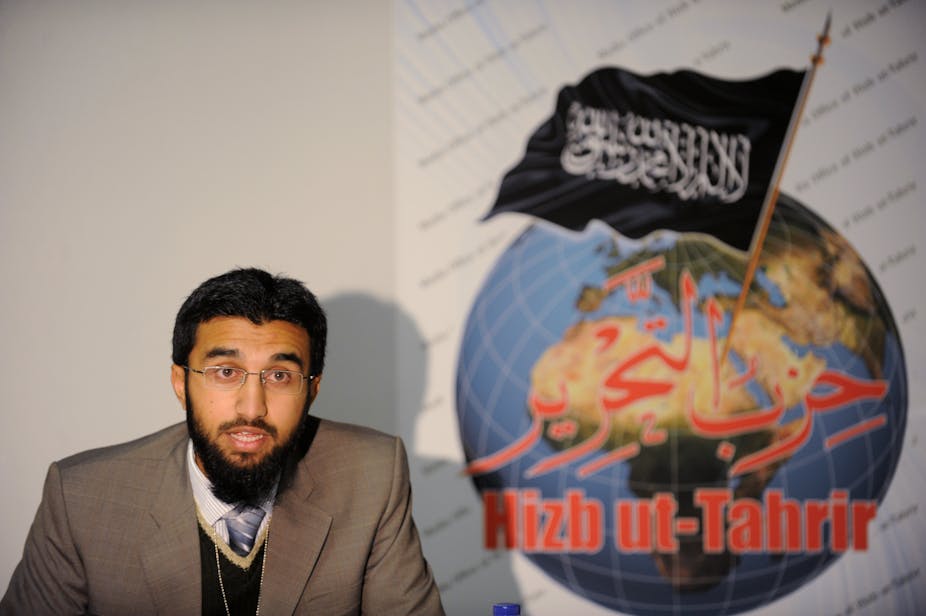Most Australians, including those of Middle Eastern background, had not heard of Hizb ut-Tahrir before the Islamic group was highlighted in the media and by Prime Minister Tony Abbott recently. Abbott said in a national security statement last week that:
Organisations and individuals blatantly spreading discord and division – such as Hizb ut-Tahrir – should not do so with impunity.
But is Hizb ut-Tahrir really an extremist group? Does it have any association with al-Qaeda or Islamic State (IS)? And why has it become important enough to be namechecked by the prime minister?
Background to Hizb ut-Tahrir
Hizb ut-Tahrir, which means “Party of Liberation”, was established in 1953 in Jerusalem by Muslim cleric and jurist Taqiuddin al-Nabhani. The party and its ideology was a reaction to the establishment of an Israeli state, which led to a massive expulsion of Palestinians from their cities and villages to other parts of the country or outside it.
The party adopted a strong anti-colonial approach mixed with a fundamentalist Islamic inclination. Turning towards religious fundamentalism was a response to the failure of a series of reformist projects introduced by contemporary Muslim thinkers such as Abd al-Rahman al-Kawakibi and Ali Abdel Raziq. They and others criticised the despotism in the Ottoman Caliphate. They called for a civil, semi-secular state.
Hizb ut-Tahrir rejects democracy, secularism and all Western models of state. It calls for the establishment of an “Islamic state” based on the early Islamic model of caliphate. It views:
Western civilisation and Islam as dichotomous entities with mutually exclusive ideological underpinnings, both of which competed to dominate Muslim societies.
Unlike jihadi groups such as al-Qaeda and IS, Hizb ut-Tahrir rejects the adoption of violence. It has not been involved with terrorist operations in either the Muslim world or worldwide.
In his book The Islamic State, al-Nabhani described the process of establishing an Islamic caliphate in three steps: the formation of a group of elites who carry the da'wah (invitation) to Muslim societies to support an Islamic state; the idea spreading among societies until it becomes supported by the majority; and the government responding to the majority’s demand.
Although Hizb ut-Tahrir is not a terrorist organisation, its radical doctrines have been adopted by jihadi groups such as IS. However, Hizb ut-Tahrir leaders deny IS’s legitimacy as it is not established in the correct Islamic way.
Also, the more extreme groups such as IS consider Hizb ut-Tahrir a barrier to the Islamic project and oppose it strongly. Hizb ut-Tahrir has supporters in the Middle East, Central and Southeast Asia, and some Western countries. Nonetheless, it does not have a serious influence on prevailing events in the Middle East or on the West’s Muslim communities.
Hizb ut-Tahrir in Australia
Hizb ut-Tahrir’s spokesman in Australia, Uthman Badar, wrote in response to the national security statement that the group does not rely on violent methods. No Hizb ut-Tahrir members have been prosecuted for any terrorism-related offence.
In 2005, former attorney-general Philip Ruddock said, on ASIO’s advice, that:
There is no basis under current legislation for specifying Hizb ut-Tahrir as a terrorist organisation under the Criminal Code.
Badar did not mention Hizb ut-Tahrir’s extreme discourse not just against the West, but also against the non-Sunni sects within Islam.
This seems to be a relevant matter that the Australian government must consider. But is having such a discourse considered a criminal offence that must be dealt with legally? The more serious question is what Hizb ut-Tahrir has to do with the Muslim community in Australia that would justify Abbott generalising the issue and asking Muslim leaders to “speak up and mean it”.
Hizb ut-Tahrir is not a political party. It is not active in any Islamic schools, mosques or institutes. It does not have any real influence on Australia’s Islamic community. So why must all Muslim leaders be responsible for a matter irrelevant to them?
In early 2008 – more than six years before the Sydney siege – the Islamic Shia Council of Australia, which represents the 30,000 Australian Shi'ite Muslims, demanded that the federal police investigate Sheikh Haron Monis. This followed his insulting letters to the families of Australian soldiers killed in Afghanistan. The council spoke loudly and meant it about the man who had announced himself as a Shi'ite cleric:
We don’t know him and we have got nothing to do with him … We don’t follow, we don’t support and we don’t stand with anyone we don’t know. He’s not one of us.
A serious and effective anti-terrorism policy needs to be comprehensive to cover more than just security dimensions. It should not lead to more divisions in society.

